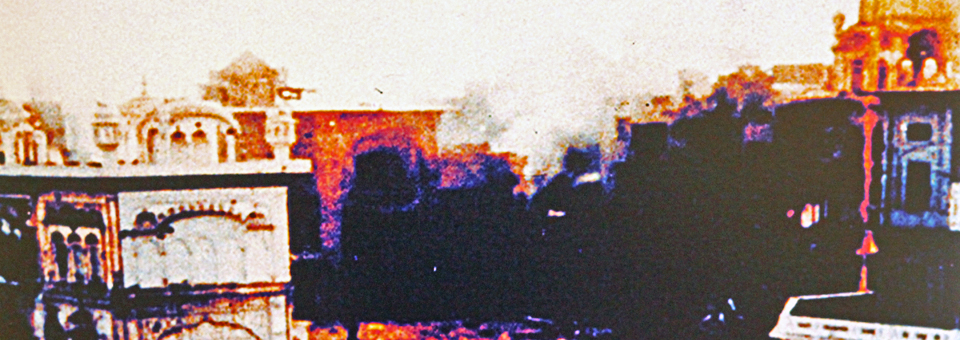There are two types of Sikhs: women and men. That’s not actually true, but you’d be forgiven for thinking it was if you looked around at the Sikh Diaspora. There is only one type of Sikh and that is a student of the Guru who learns and tries to put into practice the way of the House of Guru Nanak. Both men and women who choose to lead their lives as Sikhs are subject to the same philosophy and have the same goal to emancipate their mind to an elevated state whilst here on Earth. Any differences are merely biological and should have a low impact on the practical living and spirit of a Sikh. Why is it then that despite being some way into the 21st century we still have not learnt this and are seeing few female Sikhs talking about the community, representing us publicly or publishing their opinions?
I founded Naujawani.com with a long-term plan to provide a media platform from which global affairs and everyday social issues could be discussed from a Sikh and Punjabi perspective. From years of experience working in media and broadcasting, I knew that starting something like this with a huge fanfare overnight would waste valuable resources as would opting to utilise the traditional formats of TV and radio, and so we have worked our way gradually towards becoming a staple destination for news, views and entertainment online – devoting our initial time to testing ideas for shows, writing on a range of topics and producing pilots for review. We were lucky enough quite early on to procure the services of one of the most intelligent Sikhs anywhere in the World, Ranjit Singh ‘Kuki’ Gill as a writer and broadcaster, and have most recently added a similarly regarded writer Avtar Singh to publish global news in Punjabi. After much tweaking, our video shows are also about to become a weekly fixture online following on from the success of our first consistently broadcast show Left v Right.
But as we near out 7th anniversary and ever closer towards operating on a daily basis, we have yet to regularly publish the work of female writers and contributors. This deficiency has been a growing concern for me particularly as I have met with more than half a dozen female broadcasters in recent years, all of whom have expressed a desire to write or present, but for a variety of reasons have not done so once offered the opportunity. I have wanted to know why this might have been as it surely cannot be coincidence and so have spent some time over the last year revisiting correspondence and collating the reasons given, as well as speaking to two female writers who will be introduced on Naujawani.com over the coming weeks. Some of what I learnt has already been briefly touched upon in two previous articles – ‘Fighting Injustice in a Man’s World‘ and ‘What is our attitude towards women?‘ – but here I would like to look directly at why Sikh and Punjabi women shy away from speaking about their experiences, ‘our community’ and the way we live.
The major reason that I have found women do not want to join our Naujawani.com team is that they feel vocalising their thoughts without anonymity in a public space will leave them open to attack. This is largely thought to take the form of a verbal attack through social media, the wider internet or even in person, but it is the manner of these expected responses which is most troubling. Some of the women I have gone back and spoken to suggested that they have seen other women being put down in such a way that it leaves them in a position from where it is difficult to speak again with any credibility, simply for speaking their mind. They understandably are wary of having a public opinion when whatever they say is met with a thinly-veiled swipe at their level of understanding, their character or the way that they look. I would suggest that men suffer similar responses, but I have to agree that we are less prone to being targeted as individuals over the content of what we have said. In addition, whilst nobody wants to be put down before the watching World, I’ve come to realise that being put down as a woman has serious repercussions. The mud slung in her direction does not just stick to the woman, but merges with her and compounds the already distinct way in which she is seen. It impacts her beyond the professional sphere to her personal, familial and social life in a way that I cannot understand, despite my own encounters with character assassination.
We do have a female writer on our staff – Sonia Kaur Bains – who contributed reviews of Punjabi music releases over a period of some months in the last year, but as we were trialling that format (soon to return in a revamped guise) we were never able to publish her work regularly. However, it was partly what I saw in the way she was received that led me down this road. For example, a prominent bhangra producer objected to the way in which her review of his single was not gushing with enthusiasm and blocked her on twitter, passing belittling comment in the process. But when I tweeted in reply that a mistake in the music review was my responsibility as editor his reply was altogether less curt and he wished us well. His behaviour is indicative of the way women continue to be seen as easy targets, not just in the Sikh and Punjabi community but throughout the World. Speaking to two new female writers that we are welcoming to Naujawani.com this autumn, they admitted to feeling intimidated in the highly charged environment where Sikh and Punjabi issues are discussed: the language that is being used is aggressive, some of the views are intolerant and most responses lack critical thinking or productive output. In my initial response to them I couldn’t hide my laughter and agreed entirely with their sentiments, adding that I had been subjected to exactly the same demoralising forces – we all are! But of course the way a woman would perceive that level of threatening behaviour is different as it is yet another obstacle to overcome in a race where unlike men they have been browbeaten from before the start.
Women across the globe are expected to maintain certain traits and nowhere is this more starkly seen than in South Asia where ideas of virtue and the business of motherliness is deeply embedded. All too often the ridiculous concept of izzat (honour) is unintelligibly touted as a Sikh ideal when it is the very antithesis of Guru Nanak’s teachings and should be seen as one of the key concepts that needs to be removed if we are to create a more utopian society. Female family members themselves are often responsible for asserting the notion that the activities of women in the household must not diminish the family name, but I think that would disappear rather quickly if men were to change their attitudes. Suggesting to Indian men that they reconsider their position on how the women in their family are perceived for doing what they want to do has always been a dangerous activity, but as with the rest of Guru Nanak’s revolution in South Asia it was never intended to appease an oppressive society. We would do well to remember that when the Guru spoke to women just as he did to men and accepted both as equal travellers of a Divine Design, he did so because it was a Universal principle. Today the custodians of our way of life have largely forgotten what that should have meant in an India that benefited from being the ‘home of Sikhs’ after the partition of Punjab; instead they have brought it with them to their new homes in foreign lands.
So it brings me to what can be done. As a wise friend commented in a Facebook post I made preceding this article, we need to change the way we define men and women in our community. That is a huge ask, but there is no reason why we cannot begin with our own close-knit circles and build up to a greater level (much like we have done with Naujawani.com as a business). My father always told me that if my behaviour was such that it made a woman feel uncomfortable, then it was not the behaviour of a Sikh and that it should not be acceptable anywhere even if I was sitting solely amongst other men. We men need to be the change we want to see and should consider the ideas, tone and language that we use when in an all-male circle. As sons, brothers, husbands and fathers, we should look to encourage the women in our life to speak freely and follow their dreams just as we do ourselves.
Although their number is dwarfed by male peers, there are female activists out there and we should do everything we can to support them. Sometimes that might mean being there for them physically or emotionally, but on every occasion it means engaging with them as you would respectfully do with any man. On a personal note, I would like to think that I live in such a way already, but clearly it has not transported to the way Naujawani.com is seen by prospective writers and broadcasters. That has to change and for me that means providing a more protected place for all of our team, men and women, to speak freely and without the fear of personal repercussions. I must make mention of the fact that joining our team of writers and contributors at Naujawani.com is not the easiest decision for any person, man or woman. As regular readers of our website will be aware, we do not refrain from speaking out against powerful individuals, organisations or even Governments and have gained a reputation (albeit a little known one) for speaking out against oppression, coercion and general acts of wrong-doing that are holding back society from advancing forward to a better World for all. But leaving that aside as a separate reason not to join our team, I would like to hope that we can help provide a platform for women to speak out and not just in the Sikh and Punjabi community. Sikhs are certainly not the only ones with this problem, but they are the only people whose very philosophy is based on allowing everyone (man or woman) to make their voice heard. If we Sikhs are making it difficult for women to speak out and engage wholly in society, what chance does the rest of the World have?





